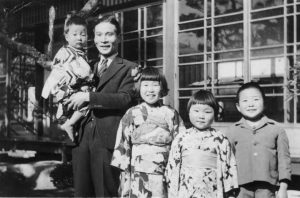My Life—Interview with Keiko Ogura (1937–), interpreter and A-bomb survivor, Part 4: Passion for English
May 2, 2023
After war ended, learned reality of society
After Japan’s defeat in war, Ms. Ogura and her older sister were temporarily evacuated to an inn located in the village of Asuna (present-day Onan-cho) in Shimane Prefecture.
A rumor had spread that all children would be killed and women raped when the occupying forces arrived. The rumor was soon found to be false, and I was able to return to home to the area of Ushita (in Hiroshima’s present-day Higashi Ward). It was hard for a large family to make ends meet in Hiroshima after the atomic bombing. For that reason, our family was divided into two groups. I went back to Asuna and spent several months there with my mother and younger brother and sister. I was outgoing and active in the village, playing the part of child actor in rural theatrical shows, and other activities, soon after our arrival.
I saw a soldier from the occupation forces for the first time on our way to secretly deliver rice from Asuna to the rest of our family—my father, older brother, and older sister—who had stayed behind in Ushita. In the black market that had developed in front of the Hiroshima train station, I saw men with Japanese prostitutes, who were called “pan-pan” in those days. During wartime, I was taught that all Americans and British people were evil and brutish and that our enemies had big noses and blue eyes. I had imagined that they would have the appearance of a Japanese Tengu (long-nosed goblin). But when I saw the soldier in person, I was surprised at how beautiful he appeared in reality. The other surprise were the aid shipments sent from the United States, known by the acronym L.A.R.A. (Licensed Agencies for Relief in Asia). I was also impressed with the jewel-like jellybeans and chocolates my father had obtained in the black market. From that, I was conditioned to associate English with something delicious. My passion for English began then. I tried hard to read the words written on wrapping paper. The first English word I learned was the chocolate brand name “HERSHEY.”
Because she wanted to study English, she went to Hiroshima Jogakuin Junior and Senior High School, which had teachers from overseas.
When I was asked to recite the alphabet in the interview part of the entrance exam, I got to R but was unable to come up with the next letter. I therefore continued with, “O, P, Q, R, seven, eight, nine, ten.” Fearing failure, I ultimately found out I had passed the exam. I encountered Christianity at the junior and senior high school and learned about the spirit of service. I went to school about an hour earlier than the other students and spent that time in prayer.
I behaved based on the idea that God was always watching me. For example, I joined in the care of a baby born to an American soldier and a Japanese woman that was being kept at a home for infants, and wrote letters citing scripture as encouragement for prisoners in the penal system. Through such volunteer activities, I had the opportunity to learn about the reality of society. I was baptized at the age of 17 and also worked as a Sunday school teacher. While engaged in voluntary service, I put everything I had into the school drama club’s activities. Around that time, I also worked as a child actor for NHK radio performances.
After the war, however, I suffered frequent nosebleeds. I became a bit worried because I had witnessed people dying suddenly despite the fact they had no visible health issues after the bombing.
(Originally published on May 2, 2023)








